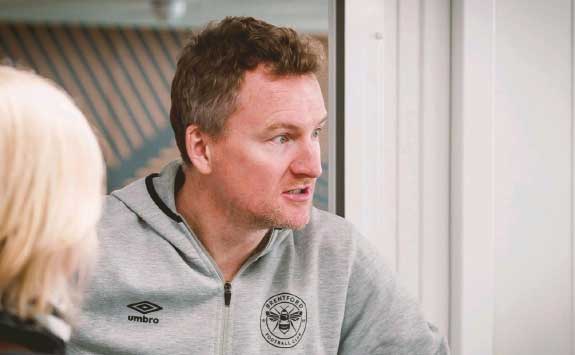Phil's story
Phil's remarkable journey to becoming the Director of Football at Brentford FC began with Mathematics and Statistics at Newcastle. His story is one of passion, dedication and a relentless pursuit of excellence in the world of football analytics
Early years and education
Phil Giles' journey began as a passionate Newcastle United fan, hailing from the North East.
He completed his PhD in Statistics at Newcastle University in 2005, following his deep-rooted interest in mathematics.
Reflecting on his time at Newcastle, Phil recalls the city's familiarity and the university's conducive environment for independent study, which proved invaluable for his academic pursuits.
"I knew the town anyway, so that was good. The location of the university is great in terms of being in the city centre and the course I completed I really enjoyed as well – it was a good, friendly department.

Studying Mathematics and Statistics at Newcastle
Originally, I signed up for a Maths and Economics degree, but after the first year I switched that to a four-year MMath Stat degree, then stayed on for a further four years to do a PhD in Statistics, also in the school of Mathematics.”
"I wanted to stay at home. I didn’t really want to move away at that point and didn’t want to lose my season ticket for Newcastle United. Secondly, I didn’t really know what I wanted to do, but thought a Mathematics and Economics degree would keep my options open – so it would qualify me for lots of future directions."
On his passion for maths:
“I liked the fact you can get some something right or wrong, so if you’ve got a good attention to detail, you can get more right than wrong, rather than writing an essay for example, which is subjective and left open for interpretation – I much prefer the definitive element of maths”.
Transition to Football Analytics
“When I left university, I wanted to go and live somewhere different as I’d been in Newcastle for 26 years.
So I went and worked in the betting industry – worked for a bookmaker for two years, then ended up working for someone called Matthew Benham (the owner of Brentford FC, then also a professional gambler).
While I was working under Matthew as a quantitative analyst, I built a lot of tools and models for predicting football matches. In 2007 he took over Brentford FC, his boyhood team, and wanted to take the club in a different direction to how it had been run in the past.
As I had a background in data and had been working under Matthew for a long time and we’d built a strong relationship - I ended up getting the job as Co-Director of Football."
-dual.jpg)
Data analysis at Brentford
“All clubs nowadays will have GPS and manage and follow the players through based on their own physical performances on the pitch which include physical metrics and output - so things like how far they run, how fast they run sprints, the total number of sprints in a game, so basically analysing the overall physical load.
Another element is the technical elements within the game about how you create chances, where you create the chances from and how that aligns to the training you’ve been doing and the playstyle you’ve been working on.
For example, in either a possession-based way or counter attacking way you want to see them things mirrored on a Saturday.
You can also look at data with other clubs and their style of play and compare it with your own players – these elements are also used in recruitment strategies.
The way I look at it is you always start with the question you’re trying to answer and support that with data.”
My job is to focus on the on-field, while the Chief Executive focuses on off-field matters - that’s the way it’s split. When trying to run a football club you can’t get into the weeds of the specific details, my job is to make sure that the scouts and the recruitment team, through their technical director have a clear plan of what we need going forward and providing all that information.
They then have their own processes around when do we watch video? When do we attend games? What do we look out for in terms of data? – and then at the end of that process, I obviously want to see that all those boxes are being ticked and we’ve completed personality references before we go and actually execute a signing.”
Phil added that he implemented this more data-driven process, but that data alone isn't solely relied upon on - adding that he sees their approach as “the best of both worlds”.
The importance of networking and skills he picked up from his time at Newcastle
“It’s massive [networking], a lot of it really is who you know rather than what you know.
The way I look at opportunities is they come up kind of randomly – the fact I ended up at Brentford was a pretty random thing actually. But it never could have happened if I didn’t put the hard work in in terms of knowing my secretary and as well as lots of different people. You’re not going to get to know somebody who ends up taking over a football club unless you get out there.
“Another skill I learned was being detail minded and accurate. That’s what mathematics teaches you – you’ve got to get every little detail right, otherwise you get it wrong – frankly – you’re 100% right or you’re wrong, and that’s it. So being detail focused and focusing on all the small bits is very important. Thinking logically and strategically through a problem from start to end is a really good skill to know.
Future Aspirations
Phil’s comments regarding speculation around Newcastle will not directly be disclosed though, as it stands, he really enjoys his role at Brentford and thrives off the challenge of maximising their potential.

Advice to students who want to work in the industry
“The one attribute everyone needs is work ethic.
In football you work when the work needs doing, which tends to be all the time. But, for example, football is a weekend sport, so if you’re involved in a matchday you work weekends and late evenings. It’s not your typical 9-5 where you do your work and you go home and you chill out, it can be pretty full on – so your work ethic needs to be extremely high to be successful in the industry.
Tribute to Professor Richard Boys
The former graduate also added he’d like to pay tribute to one of his biggest inspirations while he was at university – Professor Richard Boys, Lecturer in the School of Maths and Stats. Richard was Phil’s PhD supervisor during his time here but sadly passed away in 2019.
“He was influential in pretty much everything.”
Interview by Joel Bland on behalf of Newcastle University
